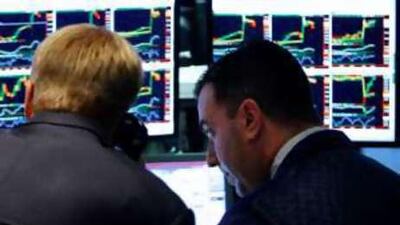After breathing life back into the financial system on Friday, US authorities began an all-out effort to prevent the world's largest economy from seizing up during the coming week as the Bush administration and Congress wrangle over a hurried overhaul of regulations accompanied by a historic bailout that could cost US taxpayers up to US$700 billion (Dh2.57 trillion).
Markets rallied on Friday as administration officials rolled out one unprecedented program after another aimed at alleviating the panic that set in earlier in the week with the collapse or hasty sale of three of the country's landmark financial institutions - the investment banks Lehman Brothers and Merrill Lynch and American International Group (AIG) insurance company. Lehman, Wall Street's fourth-largest investment bank, filed for bankruptcy protection. Merrill, under severe duress from the Lehman collapse, sold itself to a major commercial lender, Bank of America. And AIG needed an $85bn government loan to stave off bankruptcy.
The Federal Reserve and US Treasury on Friday managed to reverse the steep market slide that followed with a rapid-fire series of historic programs designed to insulate retail and corporate investors from the fallout. The Treasury department, fearing an exodus of investors from mutual funds, moved to guarantee a whole new class of mutual fund assets worth $3.4trn and said the mortgage giants Fannie Mae and Freddie Mac, which the government recently took over, would buy more mortgage-backed securities to help the housing market. The Securities and Exchange Commission temporarily banned "short selling", a way of betting a share will fall in price, for 799 stocks.
Topping all that, however, Hank Paulson, the treasury secretary who once ran the investment bank Goldman Sachs, announced that the administration would bring the largest bailout plan in history to Congress this week, saying it would cost taxpayers up to $700bn. The centrepiece of the ambitious, and sure to be controversial, plan is a massive new program that would use taxpayers' money to buy securities whose value has been impaired from ailing financial institutions. That would relieve the institutions of one of the biggest burden's preventing them from extending new loans to keep the economy going, but also spare them the worst of the consequences from years' worth of ill-conceived bets and hyper-aggressive borrowing that fuelled a string of record profits earlier in the decade.
The plan is aimed at insulating the world's largest economy from a body blow. So far, the US economy has been resilient despite the stresses and strains of the credit crunch. The economy has continued to grow at a respectable pace, to the surprise of many economists. But unemployment recently hit a five-year high of 6.1 per cent, consumer spending has slackened and gains in the dollar have started to threaten exports, the brightest spot over the past year. The Bush administration is arguing that nothing short of a sweeping overhaul of the financial regulatory structure, accompanied by huge dollops of public funds, will be enough to break the tightening grip of financial institutions pulling back credit and stem the fall in home prices tugging the economy down.
"This is a pivotal moment for the American economy," President George W Bush said. Since countries all over the world depend on US demand - from oil sales to Chinese manufactured products to holiday destinations - problems in the US economy would quickly reverberate around the globe. But the plan, which Mr Paulson urged Congress to approve in a matter of days, is already stirring up controversy that is likely to build during the week. While few question the need for drastic measures, gaining consensus on just which ones are needed could quickly turn into a political football in the run-up to a presidential election. Alan Greenspan, the once-revered central banker, called the ban on short selling a "terrible idea", while a powerful banking association took strong issue with the plan to protect mutual funds, which could now offer higher guaranteed returns than bank deposits.
Democrats, while generally supportive, increasingly looked for ways to put their own stamp on the program. They are likely to push for more help for homeowners and more pain for wealthy investors. "I want to make sure there's something in it for Main Street as well as Wall Street," said Charles Schumer, a Democratic senator from New York. @Email:bspindle@thenational.ae

